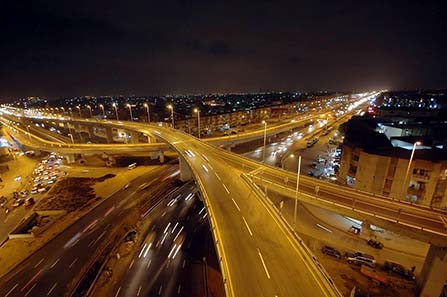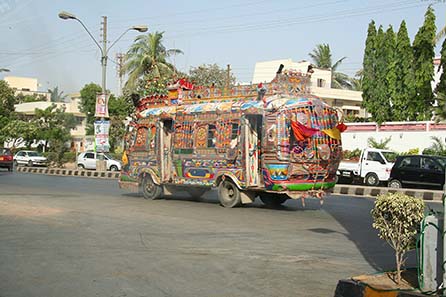June 30, 2011 – In Karachi the bus conductors have to give back exact change. But by law they are not allowed to provide themselves whith enough coins to do so. How clever people gain from this dilemma creating a new business sector you can read here.
Nagan Interchange at North Nazimabad, Karachi. Source: Wikipedia/ Suleman Sajjad.
Recently in „World Coin News“ Richard Giedroyc has published an article on a curious phenomenon in Karadchi. He bases his accounts on information from the Express Tribune.
Decorated bus in Karachi, Pakistan. Source: Wikipedia/ Mishari Muqbil.
The newspaper informs that in Karachi the bus conductors are responsible for giving their passengers the exact change – if they cannot do so they have to return the fare! A very fair law it seems to be, does it not? Since fares vary and are not rounded the conductors need a lot of coins to not break the law. And here starts the dilemma: The State Bank of Pakistan has a policy under which nobody may receive more than 500 rupees in coins in a day.
Women and children (with time to join the queues in front of the counters) take advantage of these regulations offering their daily quota of coins to coin sellers, realizing a 10% profit per transaction. Ironically these coin sellers are located nearby the State Bank headquarters. To the buyers, the conductors, they sell in increments of 100 rupees’ value, the buyer receiving 80 rupees’ value in 1, 2-, or in 5-rupee coins – with potential discounts in case of bulk purchases!
According to The Express Tribune the brokers’ alleged amount is roughly equivalent to what a rickshaw driver makes, and about twice the legal minimum wage in the city. So at least the conductors’ dilemma between law and bank policy created a new business sector giving many families an income. At the same time these families help the conductors to remain law-abiding citizens…
Read the original article „Making Profits From Small Change“ by Richard Giedroyc here.






